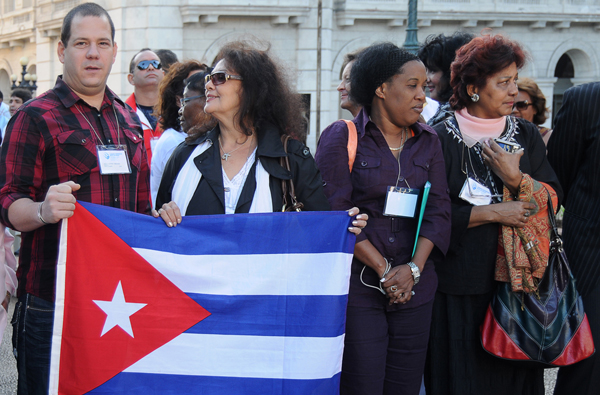CONFRONTATION OR DIALOG
Havana March 1, 2012
By Fernando Ravsberg (BBC)

Cuban immigrants honoring Jose Marti in Havana’s Central Park. (Foto: Raquel Pérez)
When I arrived in Cuba, was promoted in Washington and Miami the Torricelli Act in order to tighten the U.S. embargo, following the old system to sharpen the crisis to push Cubans to rise against the government.
In the end the politics of confrontation, based on the actions of the powerful northern neighbor, served to strengthen the mentality of “besieged” and made the U.S. propaganda and exile in “responsible for all evil” people who suffered.
The enemies of Castro lost a golden opportunity to win the hearts of his countrymen on the island. At that time would have been enough to lift the blockade on the sale of medicine and food to change its image.
From the 60’s commitment to confrontation is always accompanied by fanciful political or economic analysis of the imminent end of the Revolution.
No one knows how many times have repeated that “now it is over.”
The Catholic Church and some Western governments, tired of waiting “end time”, receiving the lash of the more radical exile when they decide to explore paths that pass for dialogue and even cooperation.
They see a new stage marked by the massive release of prisoners, commutation of death sentences, the opening of self-employment and so absurd prohibitions, such as income to the hotels or the sale of homes.
Within this framework is inserted openness to citizens living abroad. President Raul Castro took a decisive step publicly acknowledging that most migrants are patriotic and solidarity with the Cubans on the island.
Times have changed so much that even hardline exiles, as Carlos Saladrigas seek dialogue and reject the embargo, giving up “strategy of trying to harm the Cuban regime through damage to people.”
The entrepreneur leads a group that aims to support reforms promoted by the government of Raul Castro, to promote respect for sovereignty, the rights of Cubans and offer ideas to help the nation’s economic prosperity.
“Never aspire to impose, but only the right to put ideas and projects on the table,” said Saladrigas. Proposes to give loans to self employed and recognizes that “many entrepreneurs want to invest in Cuba exile in partnership with Cubans on the island.”
Now the government of Raul Castro convened a meeting in Washington with the emigre community, an event that will attend the invitation, according to sociologist Haroldo Dilla migrated in an article refuses to participate in the dialogue.
Dilla says the Cuban government is not “a legitimate representation of the nation the same way that migration can not call a group of people selected from its ideological and emotional closeness with that State.”
Intellectual cree that the call is because the island “in desperate need of money participation of emigrants in the capitalist restructuring of Cuban society and the very elite in post-revolutionary bourgeoisie.”
Although Torricelli was wrong, in the 90 left over reasons to believe that a little more pressure would be enough to overthrow the revolution, but to say in 2012 that Cuba can not survive without the investment of Miami seems like a madness.
Starting to make investments because of the Cuban migration does not need a lecture, sufficient authorization from the Cuban government to give people like Carlos Saladrigas who want to step in a while.
In addition, Cuba has trade relations with Latin America, South-South exchanges that bears fruit from Venezuela to Angola, China loans, a reserve of $ 5 billion and playing Repsol oil in the seabed.
So the problem seems more political and human. It is clear that many immigrants do not sympathize with the government and the feeling is mutual but these decades of confrontation between Cubans only served to drain the nation.
It is true that immigrants were stripped of their property on the island, deprived of their citizenship rights and sometimes abused as Mariel but the fact remains that exile organized assassinations, kidnappings, bombings, invasions and demolitions of civilian aircraft.
The community of immigrants and exiles must now decide whether it is worth accepting the offer of dialogue by the Cuban government. Dilla forward and ensuring dramatic warns that attendance at the meeting will only serve to bolster the “scaffold”.
Others like Carlos Saladrigas saying that today’s immigrants are “to contribute to the debate on the changes,” adding, “Raul Castro has called on all Cubans to present their ideas to contribute to a better Cuba and Cubans as we are, so do. ”
Sources: FernandoRavsberg-HAVANA/BBCMundo/InternetPhotos/TheCubanHistory.com
Confrontation or Dialogue / The Cuban History / Arnoldo Varona, Publisher
Confrontación o diálogo
Habana, Marzo 1, 2012
Por Fernando Ravsberg

Emigrados cubanos rindiendo honores a José Martí en el Parque Central de La Habana. (Foto: Raquel Pérez)
Cuando llegué a Cuba, se promovía en Washington y Miami la Ley Torricelli con el objetivo de recrudecer el Embargo de EE.UU., siguiendo el viejo esquema de agudizar la crisis para empujar a los cubanos a alzarse contra el gobierno.
Al final la política de confrontación, basada en las acciones del poderoso vecino del norte, sirvió para fortalecer la mentalidad de “plaza sitiada” y la propaganda convirtió a EE.UU. y al exilio en “responsables de todos los males” que sufrió la gente.
Los enemigos de Castro perdieron una oportunidad de oro para ganarse el corazón de sus compatriotas en la isla. En aquel entonces hubiera sido suficiente levantar el bloqueo a las ventas de medicinas y alimentos para cambiar su imagen.
Desde los años 60 la apuesta por la confrontación viene siempre acompañada de rocambolescos análisis políticos o económicos sobre el inminente fin de la Revolución.
Nadie sabe cuántas veces han repetido que “ahora sí se acaba”.
La Iglesia Católica y algunos gobiernos occidentales, aburridos de esperar “la hora final”, reciben los azotes del exilio más radical cuando se deciden a explorar caminos que pasan por el diálogo e incluso por la cooperación.
Perciben un nuevo escenario marcado por la masiva liberación de presos, la conmutación de penas de muerte, la apertura del trabajo autónomo y el fin de prohibiciones absurdas, como el ingreso a los hoteles o la compraventa de viviendas.
En ese marco se inserta la apertura hacia los ciudadanos que viven en el exterior. El presidente Raúl Castro dio un paso decisivo reconociendo públicamente que la mayoría de los emigrados son patriotas y solidarios con los cubanos de la isla.
Los tiempos han cambiado tanto que incluso exiliados del ala dura, como Carlos Saladrigas, buscan un diálogo y rechazan el Embargo, renunciando a “la estrategia de intentar dañar al régimen cubano a través de dañar al pueblo”.
El empresario dirige un grupo que se propone apoyar las reformas que impulsa el gobierno de Raúl Castro, promover el respeto a la soberanía, los derechos de los cubanos y ofrecer ideas para ayudar a la prosperidad económica de la nación.
“Nunca aspiramos a imponer, sino solo al derecho de poner ideas y proyectos sobre la mesa”, explica Saladrigas. Propone dar créditos a los trabajadores autónomos y reconoce que “muchos empresarios del exilio desean invertir en Cuba en sociedad con cubanos de la isla”.
Ahora el gobierno de Raúl Castro convocó a un encuentro en Washington con la comunidad de emigrados, evento al que se acudirá por invitación, según informó el sociólogo emigrado Haroldo Dilla, en un artículo donde rechaza participar en el diálogo.
Dilla asegura que el Estado cubano no es “una representación legítima de la nación, de la misma manera en que no es posible llamar emigración a un grupo de personas seleccionadas a partir de su cercanía ideológica y emocional con ese Estado”.
Cree el intelectual que la convocatoria se debe a que en la isla “necesitan desesperadamente la participación del dinero de los emigrados en la reconversión capitalista de la sociedad cubana y de la propia élite postrevolucionaria en burguesía”.
A pesar de que Torricelli se equivocó, en los 90 sobraban razones para pensar que un poco más de presión bastaría para derribar la revolución, pero decir en el 2012 que Cuba no podrá sobrevivir sin las inversiones de Miami parece un desvarío.
Empezando porque para lograr las inversiones de los cubanos de la migración no hace falta una conferencia, bastaría una autorización del gobierno cubano para que gente como Carlos Saladrigas den el paso que desean dar desde hace tiempo.
Además, Cuba tiene relaciones comerciales con toda América Latina, un intercambio Sur-Sur que da frutos desde Venezuela hasta Angola, créditos de China, una reserva de US$5 mil millones y a Repsol tocando el petróleo en el fondo marino.
Así que el problema parece más político y humano. Es claro que muchos emigrados no simpatizan con el gobierno y también que el sentimiento es mutuo pero estas décadas de confrontación entre cubanos solo sirvieron para desangrar la nación.
Es verdad que los emigrados fueron despojados de sus bienes en la isla, privados de sus derechos de ciudadanía y a veces maltratados como en Mariel pero no es menos cierto que el exilio organizó asesinatos, secuestros, atentados, invasiones y derribos de aviones civiles.
La comunidad de emigrados y exiliados debe decidir ahora si vale la pena aceptar la oferta de diálogo del gobierno cubano. Dilla se adelanta y lanza una advertencia dramática asegurando que la asistencia al encuentro solo servirá para apuntalar el “cadalso”.
Otros como Carlos Saladrigas opinan que hoy los emigrados tienen “que contribuir al debate sobre los cambios”, agregando que “Raúl Castro ha pedido a todos los cubanos que presenten sus ideas para contribuir a una Cuba mejor y, como cubanos que somos, así lo hacemos”.
Sources: FernandoRavsberg-HAVANA/BBCMundo/InternetPhotos/TheCubanHistory.com
Confrontacion o Dialogo/ The Cuban History/ Arnoldo Varona, Editor



 Letters From Cuba, Havana March 1, 2012
Letters From Cuba, Havana March 1, 2012
